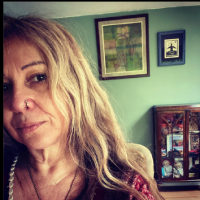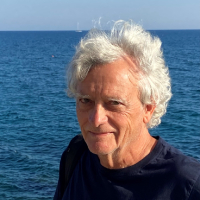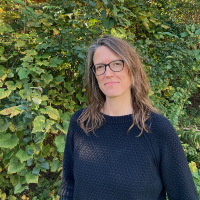Short Talks in the Anthropocene
-
Laurie D. Graham, poet; Derek Pardue, Global Studies, Aarhus University; annie ross, Indigenous Studies, Simon Fraser University; Helmut Weissert, ETH Zürich, Switzerland; hosted by Jaspreet Singh, Writer in Residence at Green College
Coach House, Green College, UBC and livestreamed
Wednesday, March 5, 5-6:30 pm, with reception to followin the series
Anthropocene Dialogues: Readings, Short Talks, and Conversations -
Four short talks. Four distinguished speakers working at the intersection of disciplines. Dr. annie ross (Indigenous Studies, Art), Dr. Helmut Weissert (Earth Sciences), Laurie D. Graham (Literature), and Dr. Derek Pardue (Global Studies, Anthropology). The event will be hosted by Green College’s Writer in Residence.
Derek Pardue
The Value of Darkness
In his acclaimed book concerning artificial light, marine ecologist Johan Eklöf writes “it is my absolute view that darkness has an independent worth.” This talk takes seriously such a claim but qualifies it significantly. The value of darkness is, like other forms of value, relative to other entities within a system. Why/How is Darkness a value? How is such a value related to light? One might begin by responding that darkness is valuable as an element of sensorial knowledge within a species’ historical traditions. To value darkness is to provoke a recalibration of human senses in a move towards flexibility and sustainability. This talk is an exploration of what this might entail and what the benefits of sensorial knowledge can be given the ongoing planetary crises facing humanity.
annie ross
reSanctify
To Put, Knit, Dream, Knit back Together all Whom we have broken apart. A short talk illustrated with images of installation pieces, we may discuss and consider waste and the concept of trash (who is?); over-consumption and its making of the loneliest; interSpecies needs, dependencies, and service; and redemption in the dull hopelessness of the anthropocene.
Helmut Weissert
The Future of Anthropocene is Outside the Discipline of Geology?
The Anthropocene, a geological term, was proposed as a new epoch in Earth’s geological history following the Holocene. It describes the increasing damaging impact of homo-sapiens on earth’s biosphere. Sapiens have altered their environment throughout their history, they engineered and altered landscapes, soils, aquatic systems. In the last 100 years they became architects of planetary change with immense impact on climate, oceans and biota. The Anthropocene was rejected by the International Union of Geosciences as new Epoch in stratigraphy. However, we continue live in Anthropocene, and the term serves as a frame for debates on our collective responsibility in finding a pathway towards a sustainable future of human life and the biosphere.
Laurie D. Graham
Fast Commute
Laurie will read from (and reflect about) her most recent book, Fast Commute, a book-length poem that takes aim at the structures that support ecological injustice and attempts new forms of expression grounded in respect for flora, fauna, water, land, and air. It also wrestles with the impossibility of speaking ethically about “the environment” as a settler living within and benefiting from the will to destroy that so often doubles as nationalism, while also offering ways to begin dealing with loss on a grand scale. Derek Pardue is an anthropologist and Associate Professor in Global Studies at Aarhus University in Denmark. He has conducted fieldwork in São Paulo, Brazil, Lisbon, Portugal, Praia, Cape Verde and Aarhus. His most recent books include Sobrevivendo no Inferno (Bloomsbury 2021, in English), and Sonic Signatures (Intellect/University of Chicago Press 2023)
Derek Pardue is an anthropologist and Associate Professor in Global Studies at Aarhus University in Denmark. He has conducted fieldwork in São Paulo, Brazil, Lisbon, Portugal, Praia, Cape Verde and Aarhus. His most recent books include Sobrevivendo no Inferno (Bloomsbury 2021, in English), and Sonic Signatures (Intellect/University of Chicago Press 2023)
 annie ross (Maya/Irish) is a Professor in the Department of Indigenous Studies at Simon Fraser University. Began education at home with plants, animals, art, Indigenous hand work, storytelling, and history in Compton, California, from parents dispossessed of their traditional lands. Developed and taught courses focusing on rights and title, environmental justice, and testimonio as a means to remedy from past political oppressions; Indigenous art histories, technologies/studio/craft, weaving, poetry and poetics, and printmaking as part of a panoply, a canon, of what we mean when we say Indigenous Bioregionalisms.
annie ross (Maya/Irish) is a Professor in the Department of Indigenous Studies at Simon Fraser University. Began education at home with plants, animals, art, Indigenous hand work, storytelling, and history in Compton, California, from parents dispossessed of their traditional lands. Developed and taught courses focusing on rights and title, environmental justice, and testimonio as a means to remedy from past political oppressions; Indigenous art histories, technologies/studio/craft, weaving, poetry and poetics, and printmaking as part of a panoply, a canon, of what we mean when we say Indigenous Bioregionalisms.
 As a geologist and geochemist, Helmut Weissert specializes in studying the co-evolution of the global carbon cycle, of climate and oceans with life through deep time. He applies a combination of geochemical and geological tools to investigate how the earth’s biosphere responded to rapid perturbations of climate in the last 250 million years. With expertise in stratigraphy, Helmut served in several committees of the International Commission on Stratigraphy. As a member and Vice-President of the Swiss Academy of Sciences (2011-2016) and as member of the Council of the European Geosciences Union (2015-2020), he was involved in public debates on planetary change and on the role of science in society.
As a geologist and geochemist, Helmut Weissert specializes in studying the co-evolution of the global carbon cycle, of climate and oceans with life through deep time. He applies a combination of geochemical and geological tools to investigate how the earth’s biosphere responded to rapid perturbations of climate in the last 250 million years. With expertise in stratigraphy, Helmut served in several committees of the International Commission on Stratigraphy. As a member and Vice-President of the Swiss Academy of Sciences (2011-2016) and as member of the Council of the European Geosciences Union (2015-2020), he was involved in public debates on planetary change and on the role of science in society.
 Laurie D. Graham grew up in Treaty 6 territory (Sherwood Park, Alberta), and she now lives in Nogojiwanong/Peterborough, in the territory of the Mississauga Anishinaabeg, where she is a poet, an editor, a community fruit tree steward, a seed saver, and the publisher of Brick magazine, a journal of literary non-fiction based in Toronto. Her third and most recent book, Fast Commute, was nominated for Ontario’s Trillium Award for Poetry.
Laurie D. Graham grew up in Treaty 6 territory (Sherwood Park, Alberta), and she now lives in Nogojiwanong/Peterborough, in the territory of the Mississauga Anishinaabeg, where she is a poet, an editor, a community fruit tree steward, a seed saver, and the publisher of Brick magazine, a journal of literary non-fiction based in Toronto. Her third and most recent book, Fast Commute, was nominated for Ontario’s Trillium Award for Poetry.
-
Unless otherwise noted, all of our lectures are free to attend and do not require registration.
Custom Lecture Fields
|